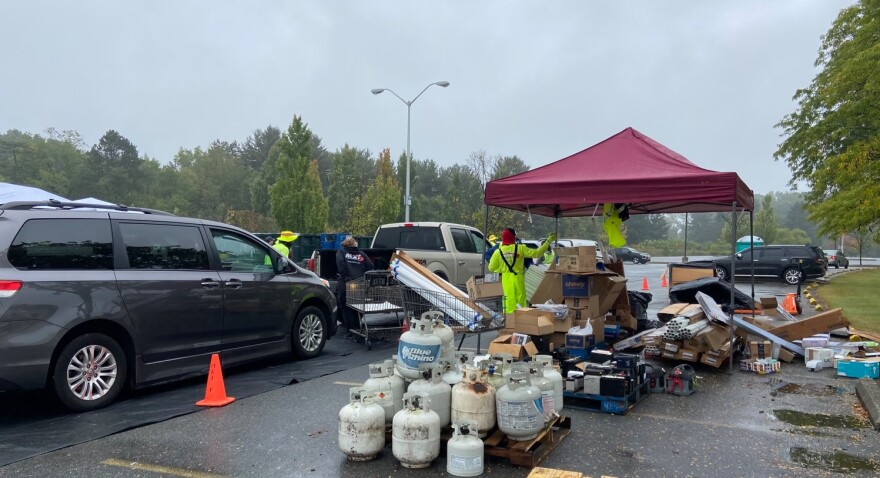BETHLEHEM TWP, Pa. — Dozens of cars wound around the parking lot of Northampton Community College on Saturday morning, drivers patiently waiting for their turn to unload hazardous waste.
“We have this event so residents have a safe place to put hazardous waste that isn't down the drain,” said Serena Davis, Northampton County’s environmental services coordinator. “Any waste that can, heads to its second life, if possible — some things are recyclable.”
Hundreds of residents showed up for the county’s annual Household Hazardous Waste Drop-Off Event.
Held at the campus at 3835 Green Pond Road,each year since 2008, the non-contact event aims to help Northampton County residents dispose of their waste — like paint, motor oil, pesticides, fire extinguishers, some batteries and aerosols — properly, in lieu of ending up in a landfill.
“If we can recycle it, that’s the goal. We want to avoid the landfill — save that space for future use.”Serena Davis, Northampton County’s environmental services coordinator
“If we can recycle it, that’s the goal,” said Davis, decked out in a fluorescent yellow jacket and sneakers as she checked the line’s progress. “We want to avoid the landfill — save that space for future use."
Paint, pesticides, pool chemicals and more
Household hazardous waste, or HHW, are generally unused household products that could explode, catch fire or be generally harmful to the environment if not properly disposed of, according to the state Department of Environmental Protection.
“Each person in Pennsylvania typically generates an average of four pounds of HHW each year,” according to the state DEP’s website. “HHW includes old paint and paint-related products, pesticides, pool chemicals, drain cleaners, degreasers, car care products and other common household products.
“If carelessly managed, HHW can create environmental and public health hazards.”
While drop-off events are becoming more common, the best way to manage hazardous household waste is to avoid creating it in the first place, state officials said.
Residents can reduce the amount of waste they create by only buying the amount of paint, pesticides or pool cleaners needed; avoid mixing leftover HHW with other products; check labels for safety instructions; and consider donating unused materials to local organizations, officials said.
‘Free and organized’
More than 1,700 people registered for Saturday’s event, Davis said. The county coordinates with Waste Management and MXI Environmental Services, a Virginia-based waste management company, to sort, collect and transport waste to its final destination — treatment, recycling or incineration.
Hey, #LehighValley! I covered Northampton County’s Household Hazardous Waste Drop-Off event today!
— Molly Bilinski, artisanal sentence crafter (@MollyBilinski) September 28, 2024
Check out Talkin’ Trash with Molly: Hazardous Waste Edition, at @LVNewsdotcom. pic.twitter.com/SDJ3JF9jXq
Cheryl Domzalski, of Bethlehem, waited in line for about 30 minutes. Asked how much she had to dispose of, she said, “Not a ton, but enough.”
For Debra Biro, of Nazareth, it was her first time attending, dropping off paint and some aerosol cans. The line was long, taking her about 40 minutes from start to finish.
“Overall, I'm very happy,” Biro said. “It’s free and organized very well.”
Registration was required, with each resident getting a 15-minute time slot for their drop-off. However, it seemed like many residents were disregarding their appointment time, and traffic backed up quickly.
Before 11 a.m., officials opened up a second parking lot, directing cars to wind around in a circle to stop traffic from building up on Green Pond Road.
After making it to the back of the parking lot, each driver popped their trunk so MXI employees could unload and sort material. While paint was a popular drop-off item, residents also brought propane tanks, fluorescent light bulbs and gasoline.
Last year, residents dropped off 165,000 gallons and 90,000 pounds of liquid and solid material, respectively, Davis said.


